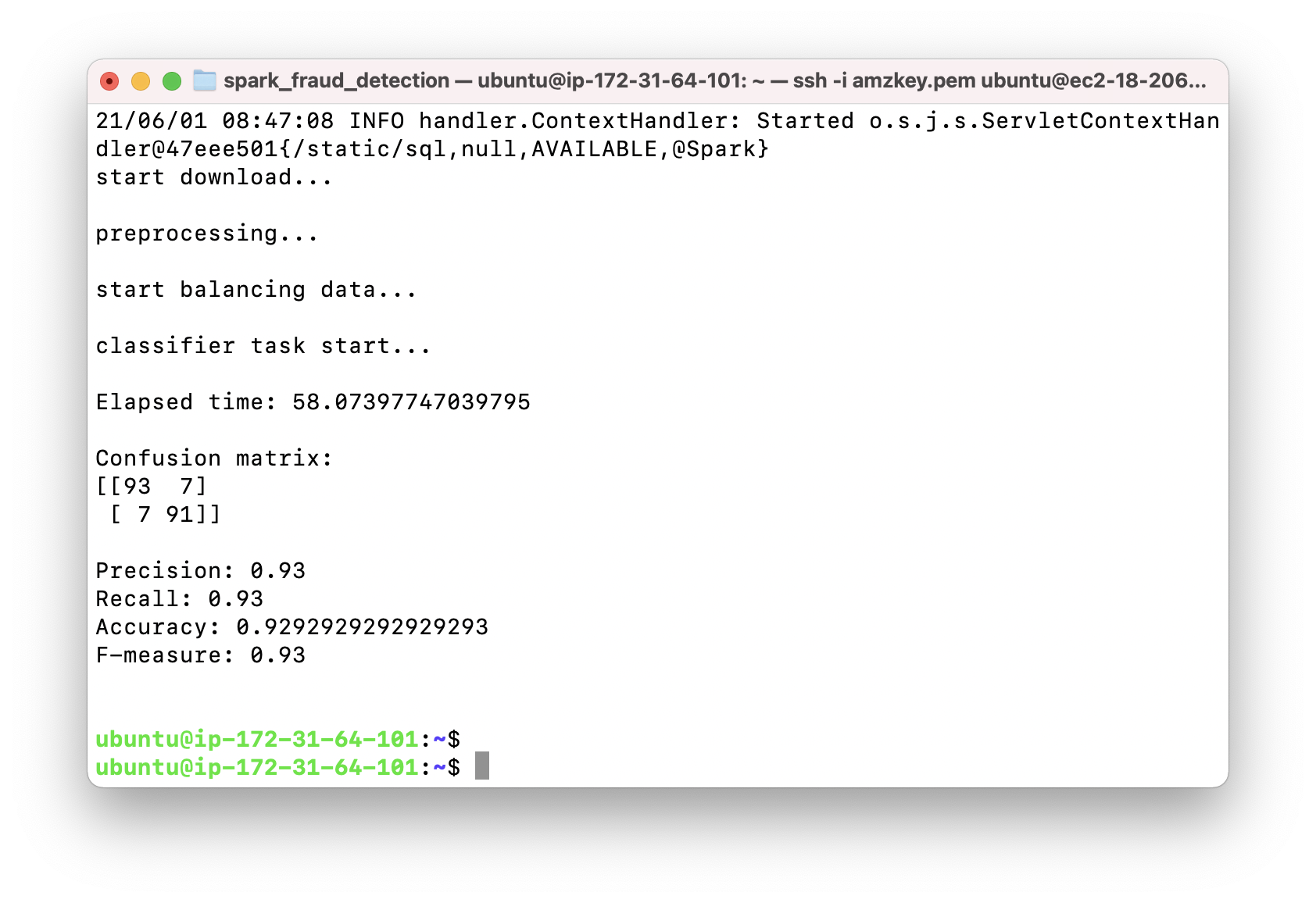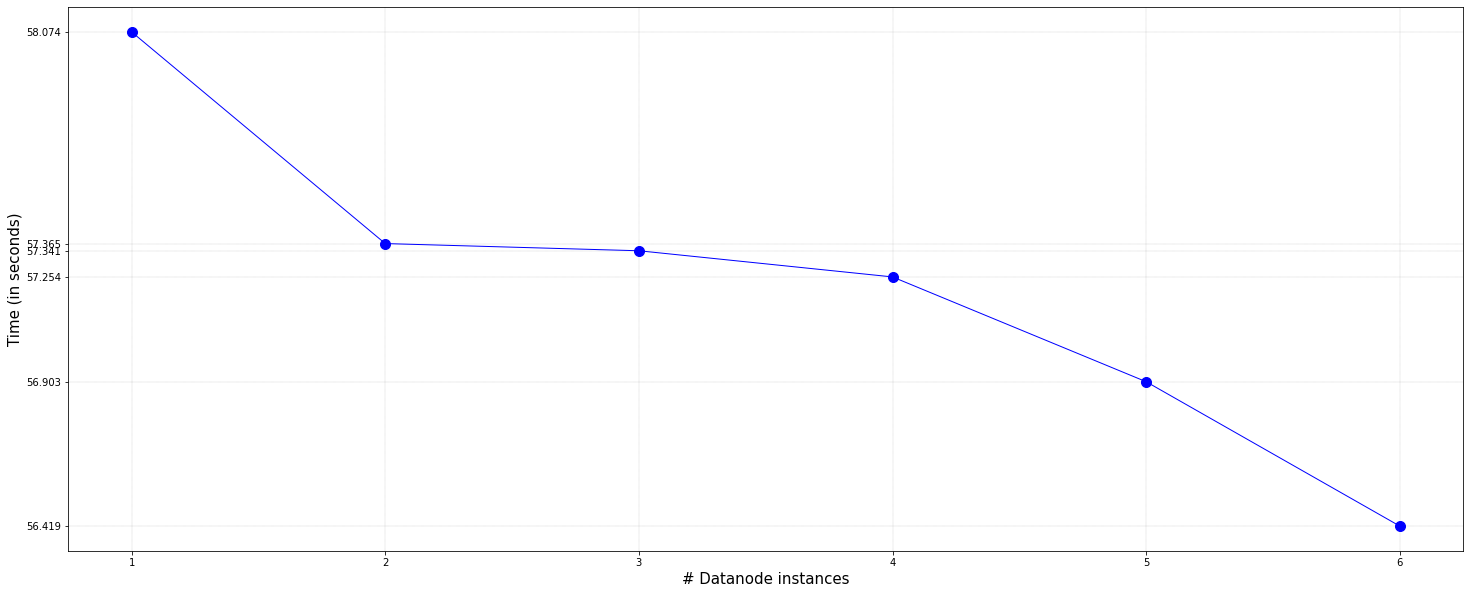An implementation of a distributed machine learning algorithm using Spark able to identify fraud in credit card transactions.
This repository contains both the ML algorithm and the code to configure the AWS EC2 nodes to run it.
The algorithm is divided in the following phases:
- Spark initialization
- Data retrieval from Amazon S3
- Data preprocessing (removing outliers and balancing)
- Dataset split (training / test)
- Model construction and classification
- Results evaluation
To run this project you need to have an AWS account. Detailed instructions are in the this section.
The dataset contains transactions made by credit cards in September 2013 by European cardholders. This dataset presents transactions that occurred in two days, where we have 492 frauds out of 284,807 transactions. The dataset is highly unbalanced, the positive class (frauds) account for 0.172% of all transactions.
It contains only numerical input variables which are the result of a PCA transformation. Unfortunately, due to confidentiality issues, we cannot provide the original features and more background information about the data.
+ - + spark_fraud_detection
|
+ - + configuration_files: file to configure the infrastructure, all the files contained in this directory are passed to ec2 instances by terraform
| |
| + - + core-sites.xml
| |
| + - + datanode_hostnames.txt: the list of datanodes (hostname only)
| |
| + - + hadoop_paths.sh: hadoop installation paths
| |
| + - + hdfs-site.xml
| |
| + - + hosts.txt: a list of pair (IP, hostname) of the hosts (namenonde and datanode)
| |
| + - + mapred-sites.xml
| |
| + - + namenode_hostname.txt: the list of namenodes (hostname only)
| |
| + - + packets.sh: a script to install the required packets
| |
| + - + paths.sh: generic paths (Java and Python)
| |
| + - + requirements.txt: required Python libraries
| |
| + - + spark-env-paths.sh
| |
| + - + spark_paths.sh
| |
| + - + yarn-site.xml
|
|
|
+ - + spark_fraud_detection
| |
| + - + classifier.py: Model construction and classification
| |
| + - + conf.py (variables)
| |
| + - + data_loader.py: Data retrieval from Amazon S3
| |
| + - + main.py: Spark initialization and main
| |
| + - + preprocessing.py: Data preprocessing (removing outliers and balancing)
| |
| + - + result_evaluator.py: Results evaluation phase
| |
| + - + utils.py: Utility functions
| |
| + - + variables.py (variables)
|
|
+ - + main.tf: Terraform main
|
+ - + output.tf: Terraform success output
|
+ - + variables.tf: Terraform variables
-
Download and install Terraform
-
Download this repository
git clone https://github.com/marinimau/spark_fraud_detection.git-
Get your credentials from aws console and set them in the "terraform.tfvars"
-
Get a .pem AWS key (following the docs) and put it in the root of the project. Call it amzkey
-
Go to the project root
cd spark_fraud_detection- Generate a ssh key called localkey (you are in the root of the project)
ssh-keygen -f localkey- Remember to change the permissions of the amzkey.pem
chmod 400 amzkey.pem- Now you are ready to execute Terraform. Launch
terraform initand then
terraform applyIt requires some time...
If all it's ok skip the following section, otherwise you probably have an error related to the subnet id.
If you have an error related to the subnet-id:
- Open the aws terminal from the aws console and paste this command:
aws ec2 describe-subnets-
Copy the value of the field "subnet-id" of the second subnet and paste it as value of the field "subnet-id" in the file "variables.tf"
-
Ensure that the IPs in the variables "namenode_ips" and "datanode_ips" are included in the subnet, if not change them in:
- ./variables.tf
...
variable "namenode_ips" {
description = "the IPs for the namenode instances (each IP must be compatible with the subnet_id)"
default = {
"0" = "172.31.64.101" # change it
}
}
...
variable "datanodes_ips" {
description = "the IPs for the datanode instances (each IP must be compatible with the subnet_id)"
default = {
"0" = "172.31.64.102" # change it
"1" = "172.31.64.103" # change it
"2" = "172.31.64.104" # change it
"3" = "172.31.64.105" # change it
"4" = "172.31.64.106" # change it
"5" = "172.31.64.107" # change it
}
}
...
- ./configuration_files/hosts.txt (namenode ips and datanode ips, don't change the hostnames)
- ./spark_fraud_detection/variables.py (conf_variables["master_ip"])
conf_variables = {
"master_ip": "172.31.64.101" if conf['REMOTE'] else "127.0.0.1",
"master_port": "7077" if conf["REMOTE"] else "<YOUR_MASTER_PORT>",
"protocol": "spark://"
}change in "master_ip" before the "if"
Launch Terraform again with "terraform apply"
- Connect to the namenode instance using ssh
ssh -i <PATH_TO_SPARK_TERRAFORM>/amzkey.pem ubuntu@<PUBLIC_DNS>you can find the <PUBLIC_DNS> of the namenode instance in the output of terraform apply when the configuration ends.
- After login execute on the master (one by one):
$HADOOP_HOME/sbin/start-dfs.sh
$HADOOP_HOME/sbin/start-yarn.sh
$HADOOP_HOME/sbin/mr-jobhistory-daemon.sh start historyserver
$SPARK_HOME/sbin/start-master.sh
$SPARK_HOME/sbin/start-slaves.sh spark://s01:7077
- Configure your aws credential
aws configureput, when required, the same values used in the file terraform.tfvars IMPORTANT: region is 'us-east-1'
- Launch the application
/opt/spark-3.0.1-bin-hadoop2.7/bin/spark-submit --packages com.amazonaws:aws-java-sdk:1.7.4,org.apache.hadoop:hadoop-aws:2.7.7,org.apache.hadoop:hadoop-aws:2.7.7 --master spark://s01:7077 --executor-cores 2 --executor-memory 14g main.py
- Remember to do
terraform destroyto delete your EC2 instances
**Required only to customize the configuration: nothing in this section is necessary for normal operation.
The editable params are organized in 2 files:
- ./spark_fraud_detection/conf.py
- ./spark_fraud_detection/variables.py
- ./variables.py
| Name | Type | Description | Default |
|---|---|---|---|
| REMOTE | bool | local/remote configuration | True |
| VERBOSE | bool | enable log in the standard output | True |
| Name | Type | Description | Default |
|---|---|---|---|
| path_variables["java_home"] | string | the path of the Java installation | "/usr/lib/jvm/java-8-openjdk-amd64" |
| path_variables["spark_home"] | string | the path of the Spark with Hadoop installation | "/opt/spark-3.0.1-bin-hadoop2.7/" |
| spark_args | string | the arguments for spark | "--packages com.amazonaws:aws-java-sdk:1.7.4,org.apache.hadoop:hadoop-aws:2.7.7,org.apache.hadoop:hadoop-aws:2.7.7 --master spark://s01:7077 --executor-cores 2 --executor-memory 20g" |
| app_info["app_name"] | string | the name for the Spark app | "FraudDetection" |
| conf_variables["master_ip"] | string | the Spark master ip (the same of the namenode IP) | "172.31.64.101" |
| conf_variables["master_port"] | string | the Spark master port | "7077" |
| data_load_variables["use_lite_dataset"] | bool | a flag for load a lite dataset (only for testing data load) | False |
| data_load_variables["bucket"] | string | the name of the S3 bucket | "marinimau" |
| data_load_variables["dataset_name"] | string | the name of the dataset inside the bucket | "1.csv" |
| data_load_variables["lite_dataset_name"] | string | the name of the lite dataset inside the bucket | "1_lite.csv" |
| preprocessing_variables["balance_dataframe"] | bool | flag to enable dataset balancing | True |
| preprocessing_variables["remove_outliers"] | bool | flag to enable outlier remotion | False |
| preprocessing_variables["remove_threshold"] | integer | remotion threshold | True |
| classifier_variables["percentage_split_training"] | float | percentage (in decimal values) for the training set | 0.8 |
| classifier_variables["training_test_spit_seed"] | int | the seed for the randm splitting | 698 |
| Name | Type | Description | Default |
|---|---|---|---|
| region | string | The region for your EC2 instances | us-east-1 |
| access_key | string | Your AWS access key (don't change here) | |
| secret_key | string | Your AWS secret key (don't change here) | |
| token | string | Your AWS token (don't change here) | null |
| instance_type | string | EC2 instance type | m5.xlarge |
| ami_image | string | AMI code for the EC2 instances (OS image) | ami-0885b1f6bd170450c |
| key_name | string | The name of the local key | localkey |
| key_path | string | The directory that contain the local key | . |
| aws_key_name | string | The name of the key generated on AWS | amzkey |
| amz_key_path | string | The path of the key generated on AWS | ./amzkey.pem |
| subnet_id | string | The subnet-id for ec2 (see instructions) | subnet-1eac9110 |
| namenode_count | integer | The number of namenode EC2 instances | 1 |
| datanode_count | integer | The number of datanode EC2 instances | 3 |
| namenode_ips | list | The IPs for the namenode EC2 instances | ["0" = "172.31.64.101"] |
| namenode_hostnames | list | The hostnames for the namenode EC2 instances | ["0" = "s01"] |
| datanode_ips | list | The IPs for the namenode EC2 instances | ["0" = "172.31.64.102", ..., "5" = "172.31.64.107] |
| datanode_hostnames | list | The hostnames for the datanode EC2 instances | ["0" = "s01", ..., "5" = "s07"] |
| local_app_path | string | The local path for your app (Python files) | ./spark_fraud/detection/ |
| remote_app_path | string | The remote destination path for your app (Python files) | /home/ubuntu/ |
| local_configuration_script_path | string | The local path of the configuration script | ./configuration_script.sh |
| remote_configuration_script_path | string | The remote destination of the configuration script | /tmp/configuration_script.sh |
| local_configuration_files_path | string | The local path of the configuration files | ./configuration_files/ |
| remote_configuration_files_path | string | The remote destination of the configuration files | /home/ubuntu/ |
| #Datanode instances | Time in seconds |
|---|---|
| 1 | 58.0740 |
| 2 | 57.3653 |
| 3 | 57.3412 |
| 4 | 57.2536 |
| 5 | 56.9027 |
| 6 | 56.4193 |
- spark-terraform: a starting point for the Terraform configuration

